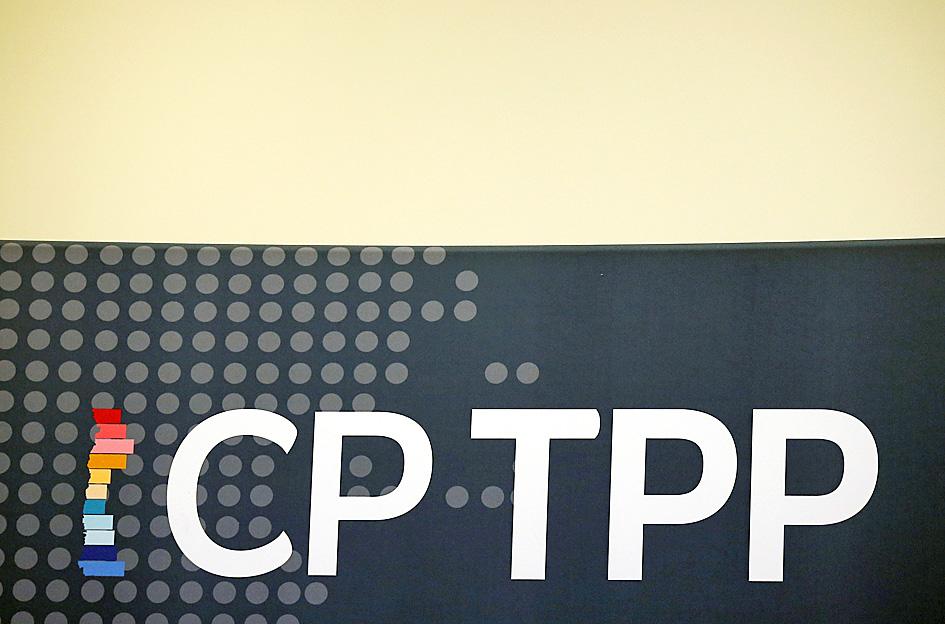The US could invoke a clause in its trade agreement with Canada and Mexico to block China’s application to join the Comprehensive and Progressive Agreement for Trans-Pacific Partnership (CPTPP), a government official said yesterday.
Under Article 32.10 of the Exceptions and General Provisions of the United States-Mexico-Canada Agreement (USMCA), if either Canada or Mexico enter a free-trade agreement with a nonmarket economy — such as China — the US could withdraw from the agreement.
“If that clause applies to multilateral free-trade agreements such as the CPTPP — which Mexico and Canada are members of — that might be cause for the two countries to oppose China’s membership,” a senior Executive Yuan official said on condition of anonymity.

Photo: Reuters
Echoing an assertion made in an analysis by The Diplomat editor-in-chief Shannon Tiezzi on Friday, the source said that China might see CPTPP membership as a means of circumventing trade restrictions imposed by the US in an ongoing US-China trade dispute.
“However, China is an authoritarian regime that lacks transparency, and its laws and market systems are far removed from those of existing CPTPP members,” the source said. “We will have to wait to see exactly what its intentions are.”
The USMCA was introduced in January last year to replace the North American Free Trade Agreement, which had been in place since 1994.
Although the USMCA was signed by former US president Donald Trump, who took a tough stance on China-related issues, US President Joe Biden has not deviated from that position, the source said, adding that the world was waiting to see how the Biden administration would react to China’s CPTPP application.
“China engages in market interference through its state-owned enterprises — that is contrary to how a free-market economy should work,” the source said. “Many CPTPP members have expressed reservations about whether China can meet the agreement’s standards.”
Separately yesterday, National Medical University liberal arts professor Chang Kuo-cheng (張國城) said that concerns that China’s CPTPP bid would affect Taiwan’s own aspirations for membership were unfounded.
Joining the agreement would not be easy for China, and would require approval from all members, he said.
Nevertheless, China’s large economy and political resources would work in its favor in attempting to join, he added.
Additional reporting by Wu Su-wei

Taiwan has received more than US$70 million in royalties as of the end of last year from developing the F-16V jet as countries worldwide purchase or upgrade to this popular model, government and military officials said on Saturday. Taiwan funded the development of the F-16V jet and ended up the sole investor as other countries withdrew from the program. Now the F-16V is increasingly popular and countries must pay Taiwan a percentage in royalties when they purchase new F-16V aircraft or upgrade older F-16 models. The next five years are expected to be the peak for these royalties, with Taiwan potentially earning

STAY IN YOUR LANE: As the US and Israel attack Iran, the ministry has warned China not to overstep by including Taiwanese citizens in its evacuation orders The Ministry of Foreign Affairs (MOFA) yesterday rebuked a statement by China’s embassy in Israel that it would evacuate Taiwanese holders of Chinese travel documents from Israel amid the latter’s escalating conflict with Iran. Tensions have risen across the Middle East in the wake of US and Israeli airstrikes on Iran beginning Saturday. China subsequently issued an evacuation notice for its citizens. In a news release, the Chinese embassy in Israel said holders of “Taiwan compatriot permits (台胞證)” issued to Taiwanese nationals by Chinese authorities for travel to China — could register for evacuation to Egypt. In Taipei, the ministry yesterday said Taiwan

Taiwan is awaiting official notification from the US regarding the status of the Agreement on Reciprocal Trade (ART) after the US Supreme Court ruled US President Donald Trump's global tariffs unconstitutional. Speaking to reporters before a legislative hearing today, Premier Cho Jung-tai (卓榮泰) said that Taiwan's negotiation team remains focused on ensuring that the bilateral trade deal remains intact despite the legal challenge to Trump's tariff policy. "The US has pledged to notify its trade partners once the subsequent administrative and legal processes are finalized, and that certainly includes Taiwan," Cho said when asked about opposition parties’ doubts that the ART was

If China chose to invade Taiwan tomorrow, it would only have to sever three undersea fiber-optic cable clusters to cause a data blackout, Jason Hsu (許毓仁), a senior fellow at the Hudson Institute and former Chinese Nationalist Party (KMT) legislator, told a US security panel yesterday. In a Taiwan contingency, cable disruption would be one of the earliest preinvasion actions and the signal that escalation had begun, he said, adding that Taiwan’s current cable repair capabilities are insufficient. The US-China Economic and Security Review Commission (USCC) yesterday held a hearing on US-China Competition Under the Sea, with Hsu speaking on